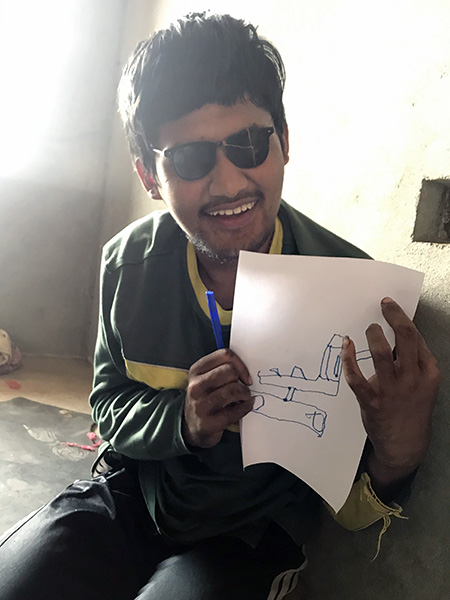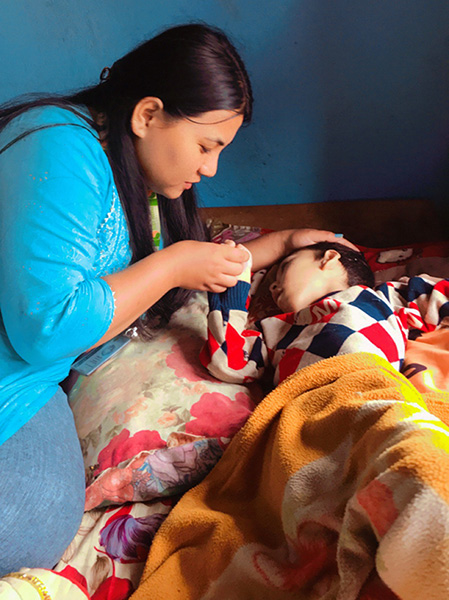FIELD STORIES
Inspiring to overcome adversities: Ambar’s story of hope.
Deepa Aryal, TSAF (Total School Approach Facilitator)
 22 year old Ambar BK lives in Helambu rural municipality, ward no. 2, Chitre, with his family of 8, consisting of his father, mother, grandfather and 5 brothers. His father, P.B. BK and mother, Rupa BK are farmers. Ambar was born with a disability so he cannot walk properly or even communicate clearly. If he has to go to the toilet, he has to drag himself there and he even tries to eat his own food slowly. He has a younger brother, Hari BK, who was born with multiple disabilities rendering him unable to sit or walk or even eat his own meals.
22 year old Ambar BK lives in Helambu rural municipality, ward no. 2, Chitre, with his family of 8, consisting of his father, mother, grandfather and 5 brothers. His father, P.B. BK and mother, Rupa BK are farmers. Ambar was born with a disability so he cannot walk properly or even communicate clearly. If he has to go to the toilet, he has to drag himself there and he even tries to eat his own food slowly. He has a younger brother, Hari BK, who was born with multiple disabilities rendering him unable to sit or walk or even eat his own meals.
Owing to the brothers’ multiple disabilities and their family’s poor financial status, it was difficult to take care of them and their other 3 brothers. As both the brothers had multiple disabilities, their parents used to take turns in looking after. Around this time, Ambar’s father met an NGO with whom he sent Ambar to Kathmandu in the hopes that he would get better care and education. After that, they didn’t hear from Ambar for quite some time, so his mother chose to visit him at the NGO’s given address in Kathmandu. What they found there was a stark contrast to how they’d imagined things to be.
Ambar was being used to beg on the streets for alms. When she was finally able to meet him the evening, she found him in a miserable condition. He was long due for a bath and he was dressed in rags. She couldn’t bear it when she found out that he was only there to beg and not study, so she immediately brought him home from there, choosing to keep him no matter their hardships. At the beginning of our project (Better Life), our facilitators had taken the See It training where we were tasked with living among the community and making observations accordingly. Owing to the terrain, lack of supportive infrastructure and awareness in schools, 12 children (5 girls and 7 boys) were out of school. The 12 children are primarily affected by multiple disabilities, autism and Down syndrome.
In order to support children with cases such as Ambar’s, we collaborated with RCRD, an organization in Bhaktapur, which has been working on such issues for the past 30 years. We connected with them to help rehabilitate these children and conducted an extensive 3 day assessment study by visiting their parents and families in their homes and providing counseling services too. During our home visits, we found out that Ambar had a keen desire to go to school and that he had been enrolled at the nearby Chitre Adharbhut School but he’d dropped out soon after having faced difficulties in going to school. He expressed a desire to go back to school and learn how to operate a bulldozer. Upon hearing this, we approached the principal of Chitre Adharbhut School, Shambunath Guragain for possible solutions since the school was not too far from Ambar’s home. Soon, he got Grade 1 books from the school and from time to time, school teachers would visit him to teach letters and give homework. Both Ambar and his brother also received nutritious food from Just Nepal Foundation.
Along with RCRD’s support, Ambar has been receiving physiotherapy continuously and there have been improvements in his condition. Earlier he used to walk on all fours but now he is able to walk on his feet slowly using a wall for support and he is even confident about standing upright now. We can gradually witness a transformation in Ambar’s life. Ambar’s is but one of many such cases in Helambu. His problem in being separated from his family could be clearly seen.
To guarantee the safety of every child, it is crucial that parents remain their primary guardians.

Witnessing a journey from darkness to dignity.
Gimju Rai, (ex) TSAF (Total School Approach Facilitator)
 In April, 2021, I was newly recruited as a TSA (Total School Approach) Facilitator under Just Nepal Foundation. One of our trainings consisted of living among the Helambu communities for 3 months, getting to know the people and making observations based on our interactions with them. This method was known as SEE IT and it provided the baseline for our Better Life project. During one of my stays, we came upon a young Tamang boy called Sanjit Tamang who was living with multiple disabilities.
In April, 2021, I was newly recruited as a TSA (Total School Approach) Facilitator under Just Nepal Foundation. One of our trainings consisted of living among the Helambu communities for 3 months, getting to know the people and making observations based on our interactions with them. This method was known as SEE IT and it provided the baseline for our Better Life project. During one of my stays, we came upon a young Tamang boy called Sanjit Tamang who was living with multiple disabilities.
We happened to meet him upon heresay. During one of our visits to the Ishing Basic School at Palchok in Helambu, we learnt of a boy who was living with severe disability. His brother happened to be studying there so we decided to pay him a visit. His home was a two-roomed house. In one of the rooms, we met his grandfather who had turned blind due to his old age. The other room, however, was locked. We asked the grandfather if there were other people living in the house too to which he replied that his son and daughter-in-law had gone to the fields and that he had two grandsons. When we asked him where his other grandson was, he said he was in the other room but the other room was locked. So, we decided to wait for his daughter-in-law to return so that we could meet his other grandson. When she arrived and we got access to the room, we were in for a shock. Inside the smelly, dark room was a bed and on that bed was as tiny figure, breathing but barely alive. Sanjit was 12 but only weighed 8kgs. His blankets were dirty, his diapers were soiled and apparently, even rats had gotten into his bed and bitten him. Suffering from congenital multiple disabilities, Sanjit could neither walk nor express his needs. On further enquiry, we found out that he had been registered under the “Ka” group with a red card but all the money that came from it was being used to support the household expenses instead. He’d also been donated with a wheelchair by an NGO but it was for a bigger person and remained unused.
Realizing that time was of the essence to Sanjit’s survival, we discussed with our team on the course of action and decided to allocate Rs.10,000 in the form of acute support for him. With it, he was given treatment, nutritious food and his room was also cleaned and re-done. After that, we reached out to our partner, RCRD, who has since been working towards his rehabilitation. Since our intervention, Sanjit has received regular health-checkups, nutrition support, physio and speech therapy from RCRD. Earlier, his parents had just about given up on him but now his father makes it a point to visit government offices to ensure his son receives their benefits. Sanjit’s family no longer spends his stipend for household expenses and we even helped his grandfather get a disability card.
Looking back, I wouldn’t change anything in our approach to Sanjit’s rehabilitation but I do wish that parents would look beyond the social taboo that being born with a disability is karma of their past life. Sanjit deserves to live a dignified life and it makes me happy that I could contribute to his wellbeing. I do hope that no child has to suffer the way Sanjit did.

Subscribe to our Newsletter
